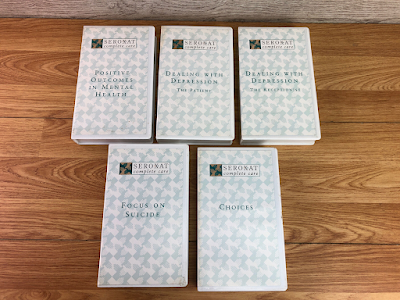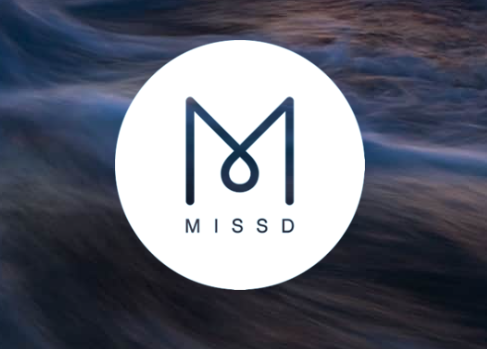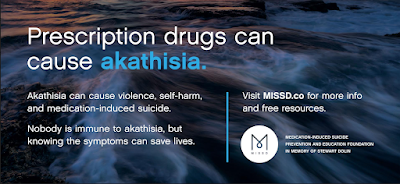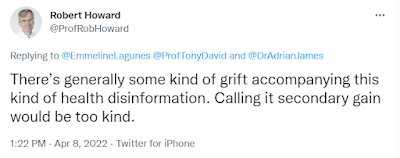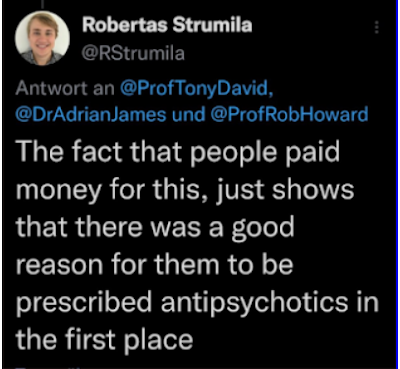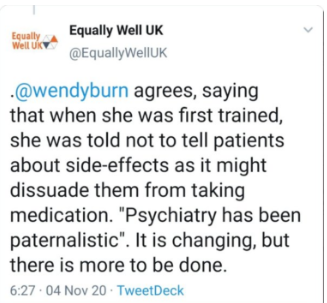Last week, Radio France ran a heartbreaking story about two young men who tragically died after taking the controversial antidepressant paroxetine. Paroxetine is more commonly known by its brand names, including Seroxat (UK), Paxil (US & Canada), and Aropax (Australia & New Zealand). The bereaved families are fighting to establish the link between the taking of Seroxat and these two suicides.
The story, investigated by journalists Par Rozenn Le Saint and Benoît Collombat, can be read in full here.
Vincent Schmitt and Yoko Motohama, parents of Romain, who was 16 years old when he tragically ended his life in September 2021, are now seeking justice. Convinced that their son's death is linked to the use of Seroxat, they have filed a complaint for involuntary manslaughter, focusing on the potential connection between the young man's suicide and the Seroxat he was prescribed.
The parents assert that their son's behavior underwent a transformation between 2-3 months after taking Seroxat, an SSRI marketed and manufactured by GSK, which exacerbated his anxiety. "It was hell," Vincent Schmitt recounted. Adding that Romain began engaging in gambling and obsessively focused on football games. His behavior became increasingly worrisome, and he directed anger towards them.
Most notably, the teenager seemed to lose all sense of danger. "One day, he impulsively swam in a lake without regard for safety. His rescue came thanks to a pedal boat," Vincent Schmitt recalled.
Around 3 months after being on Seroxat, Romain's sleeping cycle was completely reversed. His parents complained to the prescribing doctor, and bizarrely, his Seroxat dosage was increased. What started as a 10mg daily dosage, ended (by 31/2 months) to 40 mg/day. The prescriber then added Tercian to the mix before taking a 1-month vacation. Tercian, also known as Cyamemazine or cyamepromazine, is a typical antipsychotic drug. When combined with SSRIs, it increases the risk of extrapyramidal adverse effects. Extrapyramidal effects refer to involuntary movements that cannot be controlled. An example of this is akathisia.
For years, GSK has steadfastly denied any connection between their best-selling SSRI and suicide completion. Despite reaching numerous out-of-court settlements with victims' families, they maintain that Seroxat is safe and effective.
Over the years, this blog has extensively documented Seroxat-related suicides, with particular emphasis on the tragic case of Sara Carlin, a young Canadian girl who tragically took her own life. Sara's story also holds a prominent place in my book, 'The Evidence, However, Is Clear...The Seroxat Scandal.'
Sara's death at the hands of Seroxat prompted a series of recommendations at her inquest, a list that can be read here.
I reached out to Romain's mother, Yoko, to learn more about her son, Romain and what happened on that fateful day. She told me:
"I was sitting on the bench at the entrance of the station, enjoying the end of the summer's sun while waiting for Romain. It is such a tiny station, not even 10 meters away. Little did I know that Romain was already on the platform.
"From where I sat, I could see the school's entrance. It was after school, and all the kids were leaving. I heard a loud noise, possibly a train, followed by a strange silence and people reacting oddly. I started to worry that we might be late for our appointment with the psychiatrist for Romain.
"Teachers rushed to the station, and I noticed signs indicating that the train was delayed. Concerned about our appointment, I decided to call Vincent to request a car pickup. As I dialed his number, I began searching for Romain and approached a teacher to inquire about my son's whereabouts. The teacher asked for his name, and I replied, 'Romain Schmitt.' To my surprise, she abruptly left without saying a word, which struck me as strange.
"Soon, ambulances arrived, and a sense of unease began to intensify. Many firefighters gathered around me, and a man in a white coat approached. He delivered the devastating news that Romain was dead.
"For me, this marked the beginning of a profound sense of despair and loss. This is my story of that tragic day, a day that would forever be associated with suicide."
I asked Yoko what Romain was diagnosed with, she told me:
"That is also part of the question we are asking. Actually, no doctor gave us any official diagnosis. Romain liked sports and was very healthy. He liked footballers, like Christian Ronaldo. So, like many other boys of his age, he started muscle training. At the same time, he started doing a kind of special diet.
"Getting quite escalated and obsessed, his eating habit became painful to our family. Removing all fat parts, juice, sauce on the plate, and requesting a specific product, etc. But I could not really discuss with him, and he did not listen to me. He also needed to take a shower before football. He was not good at waking up in the morning to prepare for school and was always late for dinner because he needed to do muscle training just before eating, etc.
"Anyway, witnessing his new eating habits, we started seeking some help from specialists. But nothing was helpful. At the same time, I was searching on the internet what a disease could be. And we found that it can be an obsessive-compulsive disorder.
"The first psychiatrist we saw didn't believe Romain had OCD so we took him to see another. Within 20 minutes of seeing the 2nd psychiatrist, we were told that Romain's habits were a "serious disorder". Romain was then started on Seroxat."
Approximately one month later, Romain's eating habits seemed to level out, he became less obsessed with his previous dietary regime. However, he seemed to be sleeping most of the time. This, according to Yoko, was during the Covid lockdown. Things became estranged between Yoko and Romain and shortly after his dietary obsession returned.
Romain, nor his parents were informed by the prescribing psychiatrist about Seroxat's propensity to induce suicidal thinking. His father, Vincent, did, however, read the patient information leaflet where, hidden amongst the minor side-effects, was the warning about increased suicidality when taking Seroxat, particularly for patients of Romain's age.
Yoko told me, "On Friday, the morning prior to his death, he planned with his good friend to participate in some sports, and then do some homework together over the weekend. At the canteen, Romain had lunch with many friends and laughed a lot while sharing a banana."
Hours later, Romain, at the age of 16, tragically ended his life by stepping in front of a moving train.
After his death Romain's parents researched the link between Seroxat and suicidality, it was then they learned of many others who had taken their lives whilst taking GSK's powerful, mind-altering antidepressant.
Too little, too late for them but they want to warn others.
--
Gilles and Giusiana Mannoni have, along with Yoko and Vincent, also filed a complaint after their 20-year-old son, Florian, hanged himself. His father told the France Bleu website, “We learned on Thursday evening around 10 p.m. that Florian had hanged himself."
"A week later, when we gained access to the apartment, we found a prescription with a drug based on paroxetine. Florian's psychiatrist explained to us that he did not have a problem with his family or his friends, but just a problem with a rumbling in his stomach, that he was not depressed. I asked her why she prescribed the antidepressant, and she told us she prescribed it to everyone.”
Florian was due to go on a skiing trip with his parents.
Both Giles and Giusiana contacted GSK after the death of their son. They were, somewhat, callously told, adverse effects, such as suicidality, appear in the medication leaflet.
Maître Jean-Christophe Coubris, the lawyer representing both families, issued the following statement:
'Like most of us, I will never read a notice in its entirety.' He laments that most people prescribed antidepressants will not have the correct information regarding the increased risk, possibly triggering an irreversible action, which is two to three times higher. 'It's a gigantic umbrella that the laboratories open. You could even call it a parasol. I fear that no one is informed about the risks of over-suicide while taking antidepressants in all age categories."
--
Commentary
Since 2006, I've been researching GSK and Seroxat. In the case of Romain, GSK will argue that Tercian, also known as Cyamemazine, caused the changes in his behavior. This is a classic move that drug companies, and even prescribers, make when their products come under fire. They will blame anything and everything other than the product they are defending. They, along with the prescribing psychiatrist, might even suggest that Romain's apparent OCD pushed him over the edge, along with his strained relationship with his parents.
If this case goes to trial, attorneys will focus on Romain's parents and their friends, attempting to imply that Romain took his life due to their parenting skills. This situation bears a resemblance to what happened to Wendy Dolin when she filed a lawsuit against GSK. Below is an excerpt from an exclusive interview I conducted with Wendy:
"I knew when I filed this lawsuit, it was going to be a very difficult process. But I was unprepared for the sheer number of depositions and subpoenas GSK demanded. I was told this was a record number of requests. I understood the need for certain information, but it became very clear early on that GSK's goal was to send a powerful message to me: That is, when you have the audacity to challenge GSK, all attempts will be made to harass everyone you care dearly about. GSK also repeatedly tried to humiliate me. For example, depositions that should have been a few hours became eight hours in an attempt to wear people down. GSK asked the same question over and over and over again hoping to manipulate, confuse and take people's comments out of context.
"Some of the irrelevant but personal questions GSK asked me included, "How many times do you go to temple? Are you dating anyone? Who are my partners at work?" They even requested Stewart's high school transcripts. All were totally irrelevant and useless questions posed by attorneys from King and Spalding and Dentons. They were calling my friends, not identifying themselves and trying to get people to somehow say terrible things about my relationship with Stewart. There was nothing to say, of course, and GSK's attorneys just embarrassed themselves. It became a joke amongst my friends as to who would be called next and who did GSK think they were dealing with that they thought their sweet talking female attorney was somehow going to get information?"
There is a substantial amount of publicly available history regarding Seroxat on the internet, offering abundant resources for family lawyers to investigate. Unfortunately, such resources were not accessible to other families who lost loved ones to Seroxat over the years. This blog has covered many of these cases, and I'm aware that Yoko has downloaded a significant portion of my work here. It's encouraging to know that Yoko has also reached out to David Healy, who is an expert in SSRI-related issues and has historically been a thorn in GSK's side.
To be frank, I'm astonished that Seroxat is still being prescribed, given its atrocious track record of ruining lives. To give a 16-year-old 40mg of this mind-altering drug is, in my opinion, tantamount to gross negligence.
The journey ahead for both families is bound to be lengthy and filled with numerous obstacles. This endeavor is not driven by a pursuit of financial gain; rather, it's about raising public awareness so that no family has to endure the suffering that the Mannoni's and Schmitt's are currently experiencing.
No parent should ever have to bury their child, especially when such a tragedy could have been prevented, as in both of these cases.
I'd like to thank Vincent and Yoko for helping me clarify the events. It can't have been easy for them reliving such a traumatic experience.
It's worth noting that no formal case has been filed against GSK at this point. Both families have lodged complaints of involuntary manslaughter and these complaints are now being investigated.
If successful, the families could pursue lawsuits against the prescribers, the French regulatory authorities, and even GSK. The complaints are currently in the hands of the prosecutor.
--
Yoko has now created a website that you can view here (https://antidepeffects.
A photo album of Romain can also be viewed here (https://romainschmitt.
For updates and to offer your support, please follow Yoko's Twitter (X) account here (https://twitter.com/
Bob Fiddaman





